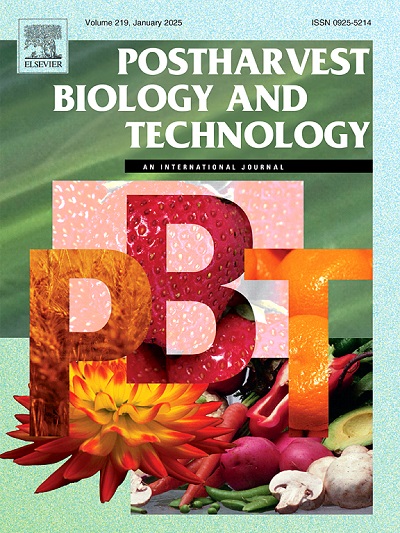Phytosulfokine treatment delays browning of litchi pericarps during storage at room temperature
IF 6.4
1区 农林科学
Q1 AGRONOMY
引用次数: 0
Abstract
Litchi, a tropical and subtropical fruit with substantial commercial value, is prone to browning after harvest. Phytosulfokine (PSK), a plant peptide hormone, plays a significant role in postharvest fruit preservation by affecting various biological processes. However, its specific effects on litchi browning have not been fully elucidated. This study demonstrates that PSK application effectively delays litchi pericarp browning, maintains a higher TSS/TA ratio, and reduces electrical conductivity. PSK treatment inhibits the degradation of anthocyanins, flavonoids, and phenolics, while also decreasing the accumulation of hydrogen peroxide (H₂O₂), malondialdehyde (MDA), and superoxide anions (O₂⁻). Additionally, PSK enhances the activities of superoxide dismutase (SOD), catalase (CAT), and glutathione reductase (GR), while reducing the activities of ascorbate peroxidase (APX), polyphenol oxidase (PPO), and peroxidase (POD) compared to the control. Transcriptome analysis reveals that PSK upregulates genes involved in plant hormone signaling and biosynthesis of anthocyanins and flavonoids, while downregulating genes associated with glutathione metabolism and autophagy. RT-qPCR confirms that PSK treatment decreases the expression levels of APX, LAC7, PPO, POD1, POD5, POD51, and PODX, while increasing the expression of GPX4, contributing to the delayed browning. These findings suggest that PSK mitigates litchi browning by modulating oxidative enzymatic reactions and suppressing the expression of browning-related genes.
植物生长调节剂可延缓荔枝果皮在室温下褐变的时间
荔枝是一种具有巨大商业价值的热带和亚热带水果,采摘后很容易褐变。植物促褐变素(PSK)是一种植物肽类激素,通过影响各种生物过程在采后水果保鲜中发挥着重要作用。然而,它对荔枝褐变的具体影响尚未完全阐明。本研究表明,施用 PSK 能有效延缓荔枝果皮褐变,保持较高的 TSS/TA 比值,并降低电导率。PSK 处理可抑制花青素、类黄酮和酚类物质的降解,同时还可减少过氧化氢(H₂O₂)、丙二醛(MDA)和超氧阴离子(O₂-)的积累。此外,与对照组相比,PSK 还能提高超氧化物歧化酶(SOD)、过氧化氢酶(CAT)和谷胱甘肽还原酶(GR)的活性,同时降低抗坏血酸过氧化物酶(APX)、多酚氧化酶(PPO)和过氧化物酶(POD)的活性。转录组分析表明,PSK 上调了参与植物激素信号转导以及花青素和类黄酮生物合成的基因,同时下调了与谷胱甘肽代谢和自噬相关的基因。RT-qPCR 证实,PSK 处理会降低 APX、LAC7、PPO、POD1、POD5、POD51 和 PODX 的表达水平,同时增加 GPX4 的表达,从而导致褐变延迟。这些研究结果表明,PSK 可通过调节氧化酶反应和抑制褐变相关基因的表达来减轻荔枝褐变。
本文章由计算机程序翻译,如有差异,请以英文原文为准。
求助全文
约1分钟内获得全文
求助全文
来源期刊

Postharvest Biology and Technology
农林科学-农艺学
CiteScore
12.00
自引率
11.40%
发文量
309
审稿时长
38 days
期刊介绍:
The journal is devoted exclusively to the publication of original papers, review articles and frontiers articles on biological and technological postharvest research. This includes the areas of postharvest storage, treatments and underpinning mechanisms, quality evaluation, packaging, handling and distribution of fresh horticultural crops including fruit, vegetables, flowers and nuts, but excluding grains, seeds and forages.
Papers reporting novel insights from fundamental and interdisciplinary research will be particularly encouraged. These disciplines include systems biology, bioinformatics, entomology, plant physiology, plant pathology, (bio)chemistry, engineering, modelling, and technologies for nondestructive testing.
Manuscripts on fresh food crops that will be further processed after postharvest storage, or on food processes beyond refrigeration, packaging and minimal processing will not be considered.
 求助内容:
求助内容: 应助结果提醒方式:
应助结果提醒方式:


